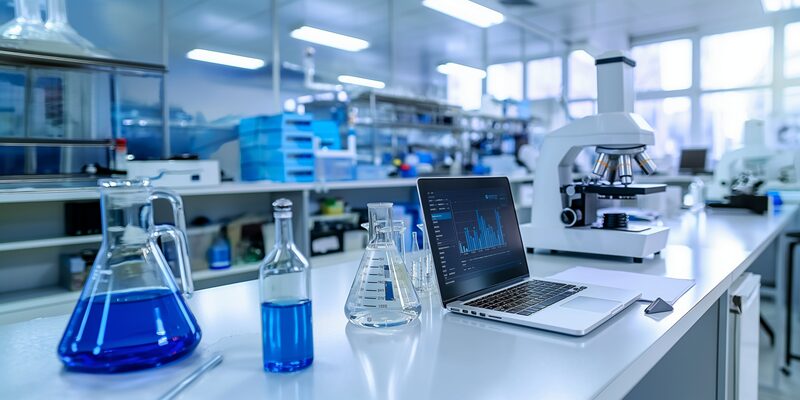Biotechnology has emerged as a driving force in transforming healthcare. Over the past few decades, the integration of biology with advanced technology has led to significant breakthroughs. These innovations are not only redefining disease management but are also improving patient outcomes. As a result, the healthcare Space is fast transforming.
Understanding Biotechnology and Its Role in Modern Medicine
Biotechnology involves the use of living organisms, cells, and biological systems to develop new products and technologies. In healthcare, its applications are vast. From drug development to diagnostics and gene therapy, biotech is everywhere. Moreover, its influence is growing stronger every year.
One of the key reasons biotechnology is crucial in medicine is its precision. Unlike traditional treatments, biotechnological methods can target the root causes of diseases. Consequently, treatments become more effective and often come with fewer side effects.
How Genomics Is Shaping Personalized Medicine
A major leap in biotechnology has come through genomics. This field focuses on understanding the human genome. Thanks to advancements in genome sequencing, it is now possible to analyze an individual’s DNA quickly and affordably. This has led to the rise of personalized medicine.
Personalized medicine tailors treatments to a person’s genetic profile. For instance, cancer therapies can now be designed to target specific mutations in a tumor. This approach not only improves treatment success but also minimizes unnecessary interventions. Additionally, it enables doctors to predict how a patient might react to a certain medication.
Furthermore, genomic data helps in identifying people who are at risk for specific conditions. Early detection allows for preventive measures, thus enhancing the quality of life.
Breakthroughs in CRISPR and Gene Editing Technologies
Another groundbreaking development in biotechnology is gene editing. CRISPR-Cas9, a revolutionary tool, has made it possible to edit genes with remarkable precision. This has opened new doors in treating genetic disorders.
Diseases such as sickle cell anemia, cystic fibrosis, and Huntington’s disease are now being studied for possible genetic correction. Researchers have already achieved success in modifying defective genes in lab settings. In fact, clinical trials are ongoing, and results are promising.
Gene editing also holds potential in combating infectious diseases. For example, scientists are exploring how CRISPR can disable viral DNA in infected cells. Consequently, this may lead to long-lasting cures.
Of course, ethical concerns exist. Editing human embryos raises moral questions. Therefore, regulatory bodies are cautious, ensuring that research progresses responsibly.
The Rise of Biopharmaceuticals and Targeted Therapies
Traditional pharmaceutical methods often rely on chemicals to treat symptoms. However, biopharmaceuticals offer a different approach. These are drugs developed using biological sources such as proteins and nucleic acids.
Monoclonal antibodies, for example, are used in treating various cancers and autoimmune diseases. Unlike conventional drugs, they precisely bind to specific molecules involved in disease progression. This makes treatments more efficient and less harmful to healthy tissues.
Additionally, biosimilars—less expensive versions of biopharmaceuticals—are making advanced therapies more accessible. As patents expire on original biologics, biosimilars are gaining approval. This shift is helping reduce healthcare costs while maintaining treatment quality.
Innovative Diagnostic Tools Powered by Biotechnology
Diagnostics have seen remarkable improvement due to biotechnology. Traditional diagnostic methods were often time-consuming and less accurate. Now, biotech-powered tools offer faster and more precise results.
For instance, polymerase chain reaction (PCR) is used extensively to detect pathogens. During the COVID-19 pandemic, PCR became a household term. It was crucial in identifying infections early and accurately.
Another innovation is liquid biopsy. This method detects cancer DNA in the blood, offering a non-invasive alternative to traditional biopsies. As a result, it allows for earlier detection and better monitoring of cancer progression.
Biotechnology also contributes to wearable biosensors. These devices track vital signs and biomarkers in real-time. Consequently, they enable continuous health monitoring and timely interventions.
Regenerative Medicine and Stem Cell Technologies
One of the most promising areas in biotechnology is regenerative medicine. This field focuses on repairing or replacing damaged tissues and organs. Stem cells play a crucial role here due to their ability to develop into various cell types.
Biotech companies are investing heavily in stem cell research. Treatments for spinal cord injuries, heart diseases, and even neurodegenerative conditions like Parkinson’s are being explored. Moreover, stem cells are being used to grow tissues in labs. This may one day lead to the development of entire organs for transplant.
Although this field is still in its early stages, its potential is enormous. Continued research and clinical trials are likely to yield life-changing therapies.
Artificial Intelligence Meets Biotechnology
The fusion of biotechnology with artificial intelligence (AI) is setting new standards in healthcare. AI algorithms can analyze complex biological data quickly. As a result, researchers are able to identify patterns and make predictions faster than ever before.
Drug discovery, for example, benefits greatly from this collaboration. AI can simulate how a drug interacts with the body, speeding up the research process. Additionally, AI helps in customizing treatment plans based on individual health data.
Machine learning is also being used to interpret genetic information. This supports doctors in making accurate diagnoses. Furthermore, AI-driven robotics are being utilized in surgical procedures, enhancing precision and reducing recovery time.
Biotechnology’s Role in Combating Global Health Crises
Biotechnology has proven to be indispensable during global health emergencies. The COVID-19 pandemic highlighted its critical importance. mRNA vaccines developed by biotech companies like Pfizer-BioNTech and Moderna were rolled out at unprecedented speed.
These vaccines were not only effective but also adaptable. Scientists could modify the genetic code to address emerging variants. This flexibility gave public health officials a powerful tool in controlling the pandemic.
Beyond COVID-19, biotechnology is being used to address other health crises. For example, biotech tools are aiding in the fight against antibiotic resistance, a growing threat. New approaches, such as bacteriophage therapy, are being explored as alternatives to traditional antibiotics.
Ethical and Regulatory Challenges in Biotech Healthcare
Despite its many advantages, biotechnology in healthcare is not without challenges. Ethical issues often arise, especially in areas like gene editing and cloning. There is concern about how these technologies might be misused.
Moreover, regulatory frameworks need to evolve to keep pace with innovation. Governments and health agencies must strike a balance between encouraging advancement and ensuring public safety.
Data privacy is another concern. With the rise of personalized medicine and digital health records, protecting sensitive genetic information becomes vital. Therefore, strong cybersecurity measures are essential.
Conclusion
Biotechnology is no longer a distant concept. It is here and making a real impact on people’s lives. From personalized medicine and gene therapy to advanced diagnostics and regenerative treatments, biotech is reshaping the healthcare landscape.
While challenges remain, the potential benefits are too significant to ignore. With continued research, ethical oversight, and responsible implementation, biotechnology will continue to revolutionize healthcare. It promises a future where treatments are more effective, diagnostics are faster, and cures for previously untreatable conditions become a reality.



































